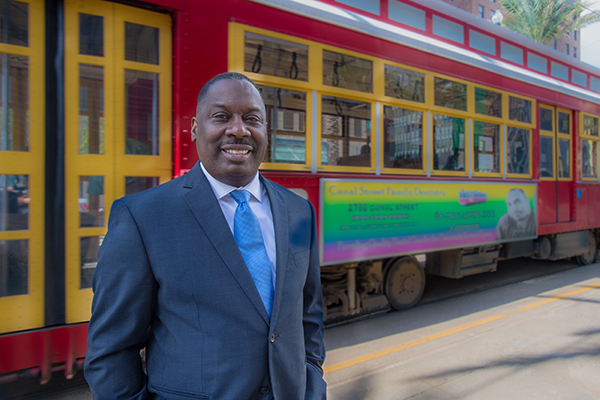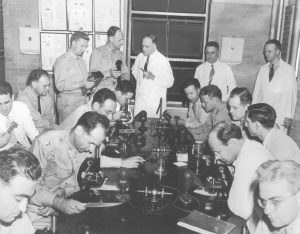
 In July the Tulane University School of Public Health and Tropical Medicine welcomed Thomas LaVeist as the 15th dean of the school. LaVeist was also named the Weatherhead Presidential Chair in Health Equity, the university’s first endowed presidential chair created to support the recruitment of exceptional, internationally recognized scholars whose work transcends and bridges traditional academic disciplines.
In July the Tulane University School of Public Health and Tropical Medicine welcomed Thomas LaVeist as the 15th dean of the school. LaVeist was also named the Weatherhead Presidential Chair in Health Equity, the university’s first endowed presidential chair created to support the recruitment of exceptional, internationally recognized scholars whose work transcends and bridges traditional academic disciplines.
“Thomas LaVeist is the perfect choice to lead Tulane’s School of Public Health and Tropical Medicine,” Tulane President Mike Fitts said when the selection was announced. “He is a recognized leader in the type of interdisciplinary, boundary-crossing research that is a hallmark of some of the most exciting work at Tulane. He will empower discovery that extends far beyond the boundaries of the School of Public Health and Tropical Medicine.”
A member of the prestigious National Academy of Medicine, LaVeist spent 25 years at the Johns Hopkins Bloomberg School of Public Health where he directed the Hopkins Center for Health Disparities Solutions. In 2016 he joined George Washington University as chair of health policy and management at the Milken Institute School of Public Health.

He has published more than 130 articles in scientific journals, focusing on the social and behavioral factors that impact health outcomes, and has engaged in these issues through lectures and articles in major media. He was also executive producer of the documentary series, The Skin You’re In, which explores the disparities between black and white health in America.
BIG PLANS
Dean LaVeist is excited to lead the venerable Tulane School of Public Health and Tropical Medicine. “We are one of the foundational schools of public health in the country,” he said. “There is a strange controversy about which is the first school of public health founded in the United States. I prefer not to join in that debate, but I would point out that 1912 [the year the SPHTM was founded] is one year before 1913 [the year the Harvard school was established] and four years before 1916 [the year the Johns Hopkins school was founded]. Nonetheless, at the very beginning of the field of public health in the United States there were three schools, and we were one of them. That is indisputable. That is the legacy and heritage of our school.”
The new dean wants to highlight the school’s heritage and encourage stakeholders of all kinds to live up to the school’s history and place in the public health community. To that end he has launched a strategic planning process that will continue throughout the fall, involving faculty, staff, and students.
“I could just come in and say, ‘This is how it will be,’” but actively engaging the community in the process will yield better results with greater ownership, he points out.
He’s also committed to addressing the financial status of the school in order to pave the way for greater innovation. One part of this effort will be to launch an office of distance learning within the dean’s office. This new office will be tasked with creating an online MPH and MHA program, as well as other virtual learning opportunities.
BUILDING ON STRENGTHS

LaVeist wants to capitalize on the school’s existing areas of leadership, w
hile also highlighting strengths that might sometimes be overlooked.
“When I first got into public health more than 30 years ago, when you thought of Tulane you thought of two things,” he says. “You thought of international health and you thought of tropical medicine. We have powerful brands in those two areas. We need to build on that and maintain our reputation in those areas.
“But we also have strengths in other areas as well. This is the 50th anniversary of the MHA program, so we’ve been producing healthcare leaders for half a century. That’s something that is unique and something we should be very proud of.”
He also wants to see a greater emphasis on the advantages presented by the school’s location in New Orleans and on the Gulf Coast.
“New Orleans is a major urban center with all of the health and social problems of other communities in urban America,” he said. “Louisiana, in many ways, also exhibits the health and social problems of rural America. This places the School of Public Health and Tropical Medicine in an ideal position to work with communities to conduct research to identify solutions to longstanding health problems, working with communities to implement solutions, and training the next generation of leaders who will work to eliminate inequities in health. This work complements perfectly the school’s extraordinary work taking place around the globe, including its historic role as the nation’s leading institution for the study of tropical medicine.”
COMING SOON TO AN ANNUAL MEETING NEAR YOU
Over the coming months LaVeist will attend the annual meetings of several significant public health-related organizations — the American Society of Tropical Medicine and Hygiene, the American Public Health Association, the American College of Healthcare Executives, and the Consortium of Universities for Global Health. He looks forward to meeting many SPHTM alumni at these meetings. He would like to see the school become more engaged with its alumni and has supported the hiring of a full-time SPHTM director of alumni affairs this fall.
Like many before him he finds New Orleans a much different city than the ones he has lived in previously, but not without its charms. “I still haven’t been able to find a bad meal here,” he laughs.
He’s eager and excited about being at Tulane, at the School of Public Health and Tropical Medicine, and in New Orleans. He envisions a great school becoming even better. SPHTM
